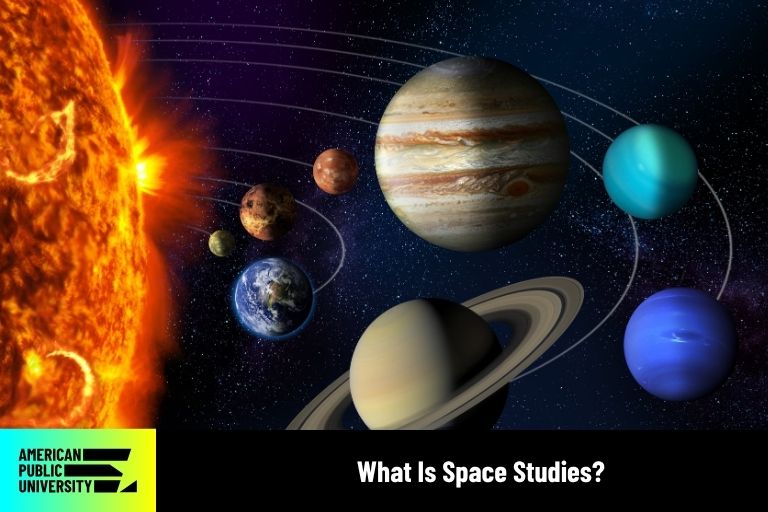08/20/2025

What You May Expect from a Space Studies Program
Space studies is an interdisciplinary field that integrates space physics, engineering, and policy to examine the complexities of outer space and its interaction with human activity. Students in this field explore topics ranging from the structure of the solar system to the technologies that enable satellite communication and human spaceflight.
In a space studies program, students explore how the space environment affects life on Earth, dive into the physics behind space operations, and examine the cultural and scientific impacts of space exploration. Space studies is a multidisciplinary field built for curious minds who want to connect science with real-world discovery.
Understanding the Foundations of Space Studies
Space studies refers to a multidisciplinary academic field that investigates the space environment, the solar system, and human interaction with outer space. It includes key domains such as:
- Space science – Studies celestial objects, solar activity, and the universe’s structure
- Space operations – Focuses on managing and supporting missions beyond Earth
- Space life sciences – Examines how life adapts to the space environment
- Space policy – Explores legal, ethical, and geopolitical aspects of space programs
By combining these areas, space studies introduces students to both technical knowledge and the cultural context of exploration, equipping them with tools to analyze global challenges through a space-based lens.
Inside a Space Studies Program
Students in a space studies program can expect an interdisciplinary curriculum covering science, policy, and engineering topics related to space. A typical introductory course in space studies covers fundamental concepts such as:
- Orbital mechanics
- Classical mechanics and rocket propulsion
- Remote sensing and space weather
- The role of international cooperation in space agencies
The curriculum also explores the history of spaceflight, space technology, and the evolution of scientific knowledge through the lens of space research. Some programs provide hands-on experience through simulations, group projects, or workshops that reflect real-world space industry challenges.
Understanding Space Science and Technology
At the core of any space studies degree is a solid grounding in space science. This includes the study of:
- The solar system and its dynamics
- Earth’s upper atmosphere and space weather conditions
- Astrophysics and the origin of celestial objects
- The impact of radiation, gravity, and temperature extremes on spacecraft
Advancements in space systems have driven innovation across disciplines, from satellites and space stations to new modes of human space flight. Space systems rely on technologies like solar power, automated operations, and high-resolution imaging—all covered in space studies coursework.
The Role of Policy and International Space Collaboration
Space doesn’t exist in isolation—it’s influenced by international law, diplomacy, and cooperation. In a space studies program, students examine how national and international space policies shape who explores space, why they do it, and how resources are allocated.
Topics often include:
- Governance of space agencies and missions
- Treaties that regulate outer space activities
- Ethical use of space environments
- Emerging private-sector developments in the space industry
International efforts like the International Space Station showcase the value of collaboration. Students may study how agencies like NASA, ESA, and JAXA engage in shared missions, technological exchange, and long-term space exploration goals.
Opportunities for Research and Hands-On Learning
Many space studies programs offer students the opportunity to engage with labs, data sets, or collaborative projects that apply scientific principles to space-related topics.
Areas of exploration may include:
- Modeling orbital dynamics or analyzing spacecraft systems
- Examining biological responses to space environments
- Exploring policy implications through interdisciplinary studies
- Interpreting satellite or remote sensing data
Space studies programs may also offer workshops or guest lectures by professionals from government agencies and the space industry, providing insights into current trends and challenges.
Typical Career Paths in the Space Sector
A degree in space studies may provide a foundation for individuals exploring careers in areas such as:
- Space systems operations
- Space policy and regulation
- Remote sensing and Earth observation
- Space research and development
- Roles that support governmental, private sector, or defense-related initiatives
No matter if a student is interested in human space flight, Earth science applications, or developing space technologies, a space studies program can help students gain the knowledge and tools needed to begin their journey.
Why Space Studies Matters
The study of space invites students to think critically about the future of humanity, the sustainability of our planet, and our role in a universe filled with unknowns. Space studies fosters:
- Analytical thinking and problem-solving
- A deeper understanding of Earth’s place in the universe
- Insight into space environments that affect life and technology
- Awareness of the social, ethical, and environmental implications of space exploration
Students are drawn to space studies for its interdisciplinary nature—linking astronomy, engineering, politics, ethics, and culture. In this way, it reflects not only what we explore, but who we are as explorers.
Preparing for a Future in Space Studies
Space studies is a dynamic, interdisciplinary area that encourages students to explore scientific, technical, and policy-related aspects of space. Topics may include celestial phenomena, space systems, and international space policy, offering a broad perspective on the complexities of space-related challenges and developments.
For those interested in planetary science, the future of space exploration, or global space initiatives, a space studies program can provide opportunities to examine these themes through an academic lens.
Understanding the academic path is just the beginning—discover how a space studies degree can support your professional goals in "What Can You Do With a Space Studies Degree?".